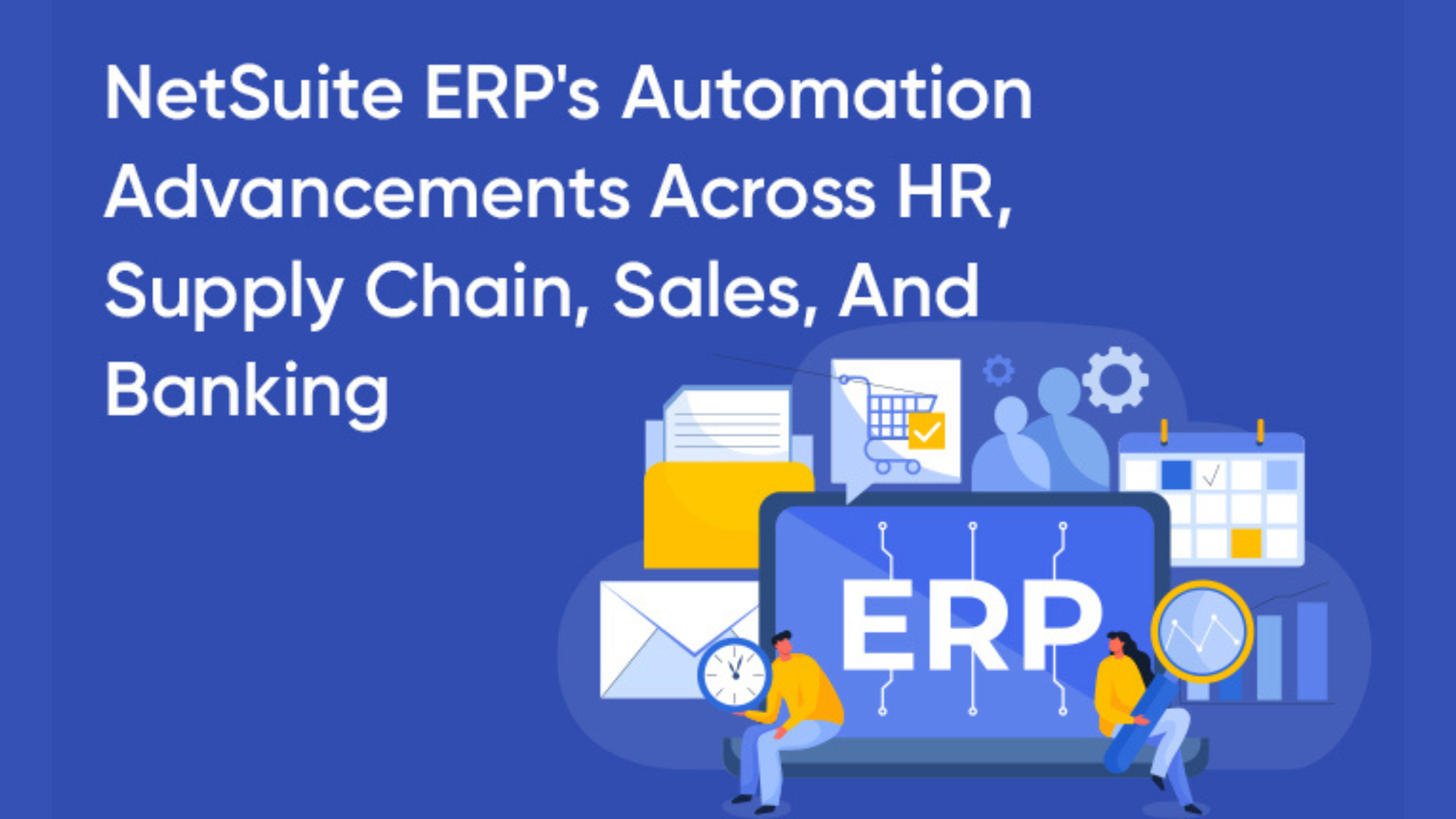Enterprise Resource Planning (ERP) systems have become integral to the fabric of modern businesses, streamlining operations, enhancing efficiency, and providing a holistic view of organizational processes. NetSuite ERP, a cloud-based solution, has emerged as a leader in the ERP space, continuously evolving to meet the dynamic needs of businesses. This article explores how NetSuite Enterprise Resource Planning ERP is bolstering automation across key domains, namely HR, supply chain, sales, and banking, ushering in a new era of seamless and intelligent business operations.
I. The Foundation of NetSuite ERP:
a. Overview of NetSuite ERP:
Briefly introduce NetSuite ERP, highlighting its cloud-based architecture and modular design.
Emphasize the flexibility and scalability that make NetSuite suitable for businesses of all sizes.
b. Key Features and Capabilities:
Explore the core features of NetSuite ERP, such as financial management, inventory control, and customer relationship management (CRM).
Highlight the interconnected nature of modules that fosters data consistency and collaboration.
II. Automation in Human Resources (HR):
a. Streamlining Recruitment Processes:
Discuss how NetSuite ERP automates and centralizes recruitment processes.
Explore features like applicant tracking, resume parsing, and interview scheduling.
b. Employee Onboarding and Management:
Analyze how NetSuite automates employee onboarding, from document submissions to training schedules.
Discuss the integration of HR modules with payroll and time-tracking for comprehensive employee management.
c. Performance Evaluation and Talent Management:
Explore how NetSuite ERP automates performance evaluation processes.
Discuss the role of automation in talent management, including skill tracking and career development planning.
III. Automation in Supply Chain Management:
a. Inventory Management and Optimization:
Discuss how NetSuite ERP automates inventory tracking and management.
Explore features like demand forecasting and order fulfillment optimization.
b. Procurement and Supplier Relationship Management:
Analyze how NetSuite streamlines procurement processes through automation.
Discuss the automation of supplier onboarding and performance tracking.
c. Logistics and Fulfillment:
Explore how NetSuite ERP automates logistics and order fulfillment processes.
Discuss real-time visibility into shipping, tracking, and delivery for enhanced customer satisfaction.
IV. Automation in Sales:
a. Lead Management and Conversion:
Discuss how NetSuite ERP automates lead management and tracking.
Explore features like lead scoring and nurturing to optimize the conversion process.
b. Quoting and Proposal Generation:
Analyze how NetSuite automates the generation of quotes and proposals.
Discuss the integration with CRM for a unified view of customer interactions.
c. Sales Forecasting and Performance Analytics:
Explore how NetSuite ERP automates sales forecasting through data analytics.
Discuss the role of automation in providing real-time insights into sales team performance.
V. Automation in Banking and Financial Management:
a. Transaction Processing and Bank Reconciliation:
Discuss how NetSuite automates transaction processing and bank reconciliation.
Explore features that ensure accuracy and compliance in financial transactions.
b. Expense Management and Reporting:
Analyze how NetSuite ERP automates expense management processes.
Discuss the generation of financial reports with real-time data for informed decision-making.
c. Compliance and Risk Management:
Explore how NetSuite automates compliance monitoring and risk management in banking.
Discuss the integration of AI-driven tools for fraud detection and prevention.
VI. Cross-Functional Automation:
a. Interconnected Modules for Seamless Operations:
Discuss how NetSuite ERP's interconnected modules facilitate cross-functional automation.
Explore examples of how data flows seamlessly between HR, supply chain, sales, and banking modules.
b. Customization and Integration Capabilities:
Analyze how NetSuite ERP allows businesses to customize and integrate additional functionalities.
Discuss third-party integrations and APIs that enhance automation capabilities.
VII. Real-World Case Studies:
a. Global Manufacturing Company:
Explore how a global manufacturing company optimized its supply chain through NetSuite ERP automation.
Discuss the impact on inventory turnover and order fulfillment times.
b. Tech Startup:
Discuss how a tech startup streamlined HR processes using NetSuite ERP.
Explore the automation of recruitment, onboarding, and talent management.
c. E-commerce Enterprise:
Explore how an e-commerce enterprise improved sales efficiency with NetSuite ERP.
Discuss the impact on lead conversion rates and sales forecasting accuracy.
VIII. Challenges and Considerations:
a. Data Security and Privacy:
Discuss the challenges associated with data security in an ERP system.
Explore best practices and features within NetSuite ERP to address these challenges.
b. User Adoption and Training:
Analyze the importance of user adoption in maximizing the benefits of NetSuite ERP automation.
Discuss strategies for effective user training and change management.
IX. Future Trends and Innovations:
a. AI and Machine Learning Integration:
Explore the future integration of AI and machine learning in NetSuite ERP.
Discuss potential applications in predictive analytics, automation enhancement, and intelligent decision-making.
b. Blockchain in ERP:
Discuss the potential impact of blockchain technology in enhancing security and transparency in NetSuite ERP.
Explore possible use cases in supply chain management and financial transactions.
c. Enhanced Mobile Capabilities:
Discuss the trend towards mobile-friendly ERP solutions.
Explore how NetSuite ERP might evolve to cater to the increasing demand for mobile accessibility.
Conclusion:
In conclusion, NetSuite ERP's automation advancements in HR, supply chain, sales, and banking are reshaping the way businesses operate. From streamlining processes to providing real-time insights, NetSuite Enterprise Resource Planning stands as a testament to the transformative power of cloud-based ERP solutions. As organizations continue to navigate the complexities of modern business, NetSuite ERP emerges as a strategic ally in driving efficiency, agility, and success across diverse operational domains.














Post Comments